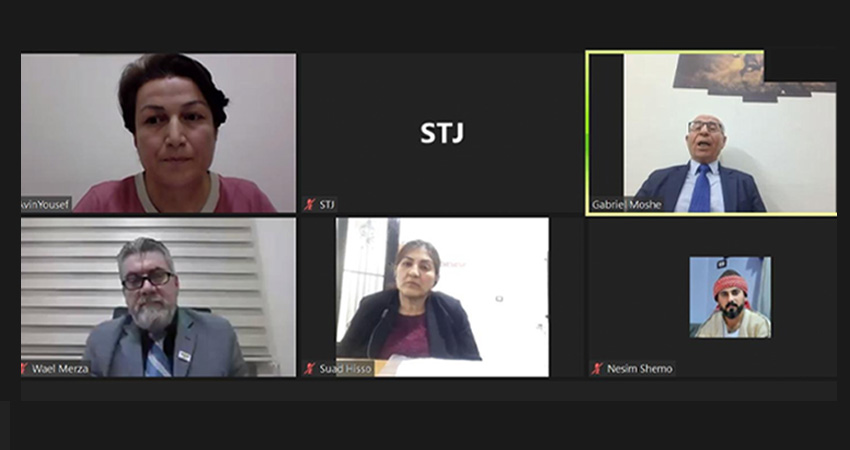On 6 February 2024, the Syrians for Truth and Justice Organization (STJ), the Synergy/Hevdesti Association for Victims, the PÊL – Civil Waves Organization, the Syriac Cross Organization, and the North Press Agency organized a webinar entitled: “Syria: The Deliberate Targeting of Infrastructure Exacerbates the Risk of Forced Displacement”.
The discussion centered on the Turkish military escalation against the essential infrastructure on which the local population relies for survival in northeastern Syria. The devastating Turkish escalation included deliberate attacks on critical infrastructure, oil and energy sources, and facilities that are indispensable to the survival of civilians, including Kurds, Arabs, Syrians, Syriacs/Assyrians, and hundreds of thousands of internally displaced people in October and December 2023, and in January 2024. The Turkish attacks panicked civilians and left many casualties among them.
The speakers warned about the risks of the Turkish attacks, mainly the forced displacement, which poses a serious threat to the area’s cultural and religious diversity. They mentioned that the area’s populace, especially the minorities, such as the Kurds, Syriacs, Assyrians, Armenians, and Yazidis, has long suffered threats that risk their historically significant presence. The speakers stressed the need for the international community to intervene to stop the targeting of vital infrastructure and facilities in northeastern Syria by Türkiye and protect civilians.
The webinar, which was held via Zoom, was attended by Gabriel Moshe, head of the Assyrian Democratic Organization, Souad Hesso, member of the Yazidi Women’s Union in Rojava, and Wael Mirza, member of the Assyrian Democratic Party’s executive Body.
-
The Discussed Topics
The head of the Assyrian Democratic Organization, Gabriel Moshe, pointed out that the recent Turkish strikes against vital infrastructure and facilities in northeastern Syria and several other factors, including tyranny represented by the current regime in Syria and terrorism represented by the Islamic State (IS) and other terrorist organizations affiliated with the political Islam affected the historical presence of all ethnic and religious communities in the region. Gabriel singled out the Syriac-Assyrian component, which was targeted from a national and religious standpoint when IS invaded al-Khabour villages.
Gabriel added that the impact of the ongoing war in Syria on the religious and national components is not surprising. “Wars, conflicts, and such [infrastructure] attacks put the humanitarian existence of Syria’s ethnic and religious components at risk,” he said.
-
“The Return Project requires stability”
Wael Mirza, member of the Assyrian Democratic Party’s executive Body, discussed the threat that looms over the inhabitants of the areas bordering Türkiye. According to him, “Türkiye has always been a corridor for extremists”, and as a result of IS attacks in 2015, the al-Khabour villages, which were historically inhabited by Assyrians, were emptied of their residents. He stated that over 90% of the 35,000 Assyrians living in al-Khabour were displaced, turning these areas into a haven for displaced people from Afrin and Ras al-Ayn/Serê Kaniyê.
Mirza pointed out that the Return Project, which aimed to repatriate displaced Assyrians back to their villages in 2016, was hindered by Türkiye’s military actions in Afrin in 2018 and in Ras al-Ayn/Serê Kaniyê and Tell Abyad in 2019. Additionally, the Assyrian villages were turned into a front line after Operation Peace Spring. He emphasized that stability is the key factor needed to ensure progress in the Return Project.
-
Yazidis are not buried in their hometown
For her part, Souad Hesso, a member of the Yazidi Women’s Union in Rojava, touched upon the violations undergone by the Yazidis in Afrin because of their religious affiliation, which included forced displacement, property violations, the destruction of religious shrines, and Turkification. She noted that the Yazidis displaced from Afrin are afraid of any new ground incursion, stressing that they continue to be targeted by Turkish bombardment in their areas of displacement in the vicinity of the al-Shahbaa area.
In the same context, civil activist Nassim Shamo noted an 85% decline in the Yazidi population in northeastern Syria between 2000 and 2023. He has emphasized that the violations that the Yazidis had to face under the Ba’ath Party, including the prevention of nationality and the seizure of agricultural land, along with the recent crimes committed against them by the factions of the Syrian National Army, are the main reasons behind their migration.
Nassim said, “We, Yazidis, who reside in the eastern region, specifically in Amuda and Al-Qahtaniyah/Terbi Sapi, at the Turkish border, are at a constant risk of displacement”. Nassim added that the Yazidis’ continuing displacement prevents them from being buried in their place of birth.
-
Recommendations
At the conclusion of the session, the speakers put forward the following recommendations aimed at promoting security and stability, and safeguarding religious and ethnic minorities from forced displacement by the Turkish attacks on essential facilities and infrastructure:
- To call on the international community, the United Nations, and the guarantors to take action to stop Türkiye from targeting vital infrastructure and facilities in northeastern Syria.
- To keep civilians out of ongoing conflicts in the region by all parties, including external actors involved in the Syrian conflict, as well as armed forces present on Syrian territory.
- To overcome the deadlock in the political operation and pressure the Syrian government and its backers to move the political process forward, revive the constitutional committee, neutralize the Syrian file from other files, and implement Resolution 2245.
- To call upon the Autonomous Administration of North and East Syria (AANES) and associated parties to stop their ideological rhetoric that may give external parties pretexts to launch attacks against northeastern Syria.
- The AANES must expand the margins of freedom and prioritize the processes of political change in the region, regardless of the consent of the political forces present in its areas.
- To launch in-depth and constructive dialogues within each of the Syrian components and among them, aimed at reaching understandings and consensus restructuring the AANES towards good and participatory governance.
- Through dialogue, the AANES must establish better relationships with neighboring countries, particularly Türkiye and Iraqi Kurdistan.

